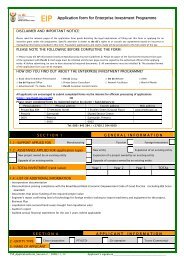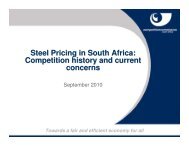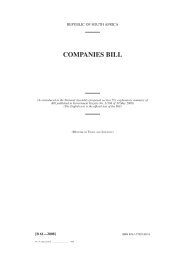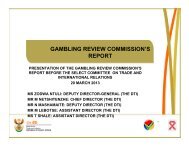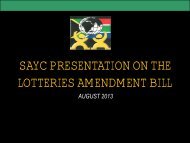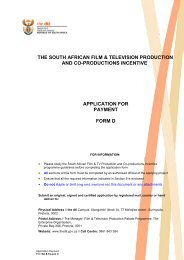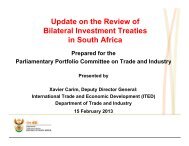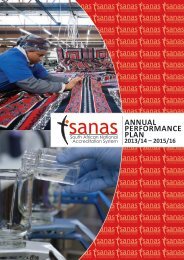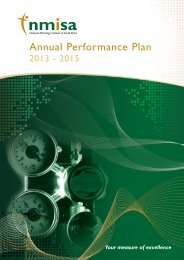Copyright Review Commission Report - ICT Law and Regulation ...
Copyright Review Commission Report - ICT Law and Regulation ...
Copyright Review Commission Report - ICT Law and Regulation ...
- No tags were found...
Create successful ePaper yourself
Turn your PDF publications into a flip-book with our unique Google optimized e-Paper software.
that cannot be distributed (such as those payable to non-members or to members with invalid accounts or inrespect of undocumented works) are retained by SAMRO.10.8.2. SAMRO retains the unclaimed royalties, which includes those in respect of undocumented works, for threeyears. Over the three-year period, attempts are made to trace the beneficiaries of the unclaimed monies. In thecase of non-members, those who are successfully traced are asked to join SAMRO <strong>and</strong> paid their share ofdistributions. After three years, the unclaimed monies are written back to income <strong>and</strong> distributed to the membersbased on the normal distribution criteria.10.8.3. The CRC was not satisfied with the success rate of the tracking process. See paragraphs 10.12.2, 10.12.7,15.1.19 <strong>and</strong> 15.2.5 below.10.8.4. The amounts that have been written back as untraceable over the last three years are listed above in Table 22(b).10.9 MUSIC USAGE INFORMATION (MUSIC LOG SHEETS)10.9.1. It was noted that music log sheets are kept mainly by broadcasters, <strong>and</strong> that general music users tend not toretain any log sheets. Collecting societies are, therefore, not able accurately to distribute royalties based onmusic usage. In cases where there are no log sheets, collecting societies use the available usage informationas a mechanism for distributing unlogged royalties.10.9.2. The use of local music content by private commercial radio stations is low (less than 30%). These stationssubmit their monthly cue sheets to the collecting societies. In the absence of appropriate log sheets fromgeneral music users, the collecting societies make use of these cue sheets to determine distributions. Generalmusic users tend to play more local music than private commercial radio stations <strong>and</strong>, therefore, the currentdistribution mechanism does not favour local music role-players.10.9.3. Some of the submissions to the CRC requested an amendment to the legislation to force every music user toretain cue sheets in order to eliminate the above-mentioned problem.10.9.4. Some users (based on the current tariffs) are only liable to pay R1 000 per annum for their licences. If alegislation is passed that will force them to log every song played, the cost associated with the administrationcould be three times more than the licence fees payable, <strong>and</strong> could discourage music users.10.9.5. For essential music users, the CRC believes that the legislation should be amended to make it compulsory forthem to retain music usage information records.10.9.6. For background music users where usage information records are not retained, the CRC believes it would bemore appropriate for collecting societies to determine the appropriate distribution bases for unlogged royaltiesby using statistical sampling based on a survey performed on different types of users <strong>and</strong> locations. Such asurvey should be commissioned.- 77 -



